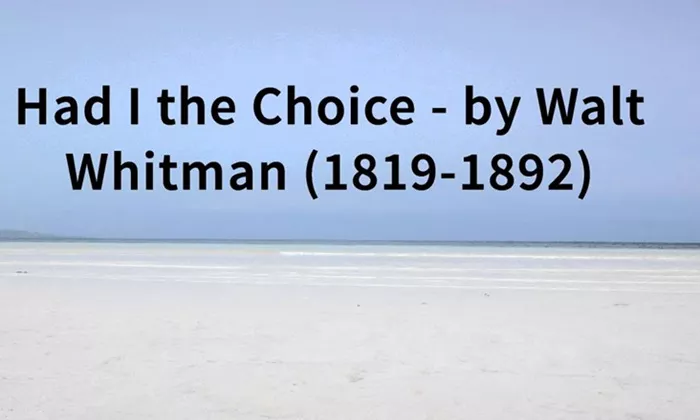Welcome to Poem of the Day – Had I the Choice by Walt Whitman.
“Had I the Choice” by Walt Whitman is a beautiful reflection on the concept of life, freedom, and the impact of personal choices. Through his words, Whitman expresses deep thoughts about the direction of life and the essence of being true to oneself. This poem explores the idea of what the poet would choose if given the power to shape his existence. The work captures the essence of Whitman’s broader philosophy of life, offering a glimpse into his ideals and beliefs.
Had I the Choice Poem
Had I the Choice
Had I the choice to tally greatest bards,
To limn their portraits, stately, beautiful, and emulate at will,
Homer with all his wars and warriors—Hector, Achilles, Ajax,
Or Shakespeare‘s woe-entangled Hamlet, Lear, Othello—Tennyson’s fair ladies,
Meter or wit the best, or choice conceit to wield in perfect rhyme, delight of singers;
These, these, O sea, all these I’d gladly barter,
Would you the undulation of one wave, its trick to me transfer,
Or breathe one breath of yours upon my verse,
And leave its odor there.
Had I the Choice Explanation
The Opening Lines: The Struggle of Choice
In the first lines, Whitman introduces the central theme of the poem: the idea of choice. He begins by imagining that he could choose the path his life would take, reflecting on the power that such a decision could hold. The opening lines set the tone for the entire piece, where the speaker questions whether life would be more meaningful or fulfilling if one had the freedom to choose every aspect of it.
The Nature of Freedom
As the poem progresses, Whitman emphasizes the importance of freedom. He contrasts the idea of freedom with the constraints imposed by society, emphasizing the need for individuals to remain true to their own essence, rather than conforming to societal expectations. The freedom to choose, he suggests, is one of the most important aspects of life. In the lines that follow, the poet imagines a life filled with rich experiences, all chosen freely, without the influence of external forces.
Personal Desire and Fulfillment
Whitman speaks about the human desire for fulfillment, suggesting that our true happiness lies in the pursuit of what is personally meaningful. The poem’s central question—what would one choose if given the chance—becomes a symbol for the struggle between fulfilling one’s personal desires and the inevitable compromises one must make in life. The poet imagines a life that is entirely his own, shaped by his choices and desires, a life where he is free to follow his path.
The Role of Nature and the Self
Whitman’s work often integrates nature as a central element of his poetry. In “Had I the Choice,” he associates freedom and fulfillment with a connection to nature, illustrating how the natural world offers an ideal space for personal expression and growth. The poem reflects the idea that nature, unbound by societal constraints, offers the freedom to explore and develop one’s true self.
The Final Lines: Acceptance and Reflection
Towards the end of the poem, Whitman shifts from imagining what might have been to accepting the reality of his life. While he considers the ideal choices he could make, he also reflects on the inevitability of certain limitations. This acceptance adds a layer of depth to the poem, showing that Whitman, although wishing for freedom, recognizes that some elements of life are beyond his control. The final lines convey a sense of peace, as the poet comes to terms with his life’s path.
Conclusion
“Had I the Choice” is a poignant and reflective poem that explores themes of freedom, personal choice, and the quest for fulfillment. Walt Whitman, through his characteristic style, encourages the reader to think about what it truly means to live a fulfilling life. He presents the freedom to choose as a powerful force, while also recognizing the complexities of life and the limitations we all face. Whitman’s poetic voice remains a source of inspiration for those who seek to understand the delicate balance between self-expression and the constraints of life.

